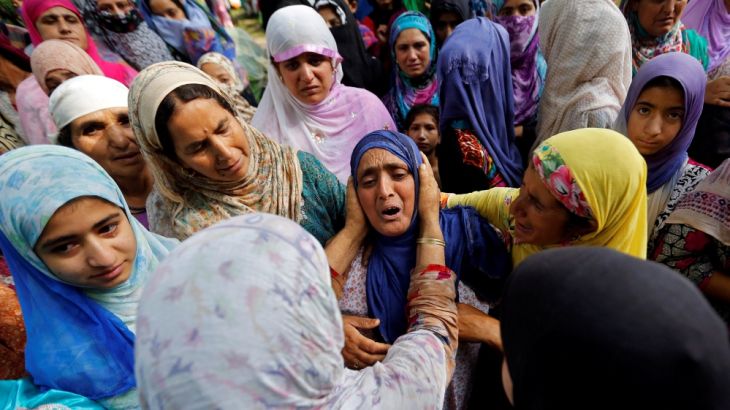Kashmiris cast doubt on Indian PM Modi’s ‘warm’ words
At a speech marking India’s independence day, PM says Kashmir’s conflict will not be solved by ‘abuse and bullets’.

Narendra Modi said force would not resolve the situation in Kashmir in a speech marking 70 years of Indian independence.
The Indian prime minister’s comments on Tuesday came amid an upturn in fighting between Indian soldiers and separatist fighters in the Himalayan region and angry protests against Indian rule.
“Abuse and bullets will not solve the Kashmir issue,” Modi said, adding “embracing Kashmiris will”.
Just two days earlier in south Kashmir’s Shopian area, three local fighters, two soldiers, and two civilians were killed in a firefight that led to street protests that wounded more than a dozen people.
The situation in Kashmir continues to be tense, particularly in its southern areas.
Indian forces have launched a major operation that has resulted in the deaths of more than 130 fighters and civilians, officials say.
‘Different reality’
Sheikh Showkat Hussain, a Kashmiri political analyst, said statements such as Modi’s about Kashmir rarely lead to improvements for its residents.
|
|
“Experts on the ground say the situation speaks of a grim reality and the government has been dealing with the civilian population with an ‘iron fist’,” Hussain said.
“This is not the first time that such statement is being made on Kashmir. What we see practically is more oppression and humiliation. These statements never get translated on the ground.”
Hussain said young men are regularly killed in Kashmir in “fake encounters”, or incidents where security forces shoot unarmed protesters and later claim they were armed attackers.
“Young boys who have joined militancy just for 10 days or a week are being killed. Modi gives these soft statements just for the media coverage and to wash away his past sins,” Hussain said.
Parvez Imroz, a leading rights activist in Kashmir, told Al Jazeera that the government in Kashmir has turned more offensive in recent years and they are adopting what he described as “Israeli tactics”.
“The reality on the ground is totally different to what Modi said today,” he said.
IN PICTURES: Enduring the effects of partition in Kashmir
“They are pushing Kashmiris to the wall; they are using these tactics for the upcoming 2019 elections. They are more inspired by the Israeli way… The Modi government doesn’t care about its image or the international community,” said Imroz.
“They just want to show that their government is strong. They are bringing more troops to Kashmir and have turned it into an open garrison. They are just provoking Kashmiris.”
Omar Abdullah, a former chief minister of Kashmir, wrote on Twitter, “PM Modi’s words for Kashmir have been very well received by people here, but everyone here is weary of yet more talk and no concrete action.”
“The proof of the pudding is in the eating. We look forward to being embraced in the warm grip of understanding, acceptance and respect.”
The moderate separatist leader Mirwaiz Umar Farooq said the resolution of Kashmir would become a reality when “abuses and bullets are replaced with humanity and justice”.
Rival claims
|
|
Nuclear-armed rivals India and Pakistan each administer part of Kashmir, but both claim the Himalayan territory in its entirety.
Separatist groups have been fighting since 1989 for the Indian-administered portion to become independent or merge with Pakistan.
Nearly 70,000 people have been killed in the uprising and the ensuing Indian military crackdown.
India maintains roughly 500,000 soldiers in the territory.
Anti-India sentiment runs deep among Kashmir’s mostly Muslim population, and most support the rebels against Indian rule.
India has accused Pakistan of arming and training the fighters, which Islamabad denies.
Armed groups have largely been suppressed by Indian forces in recent years, and public opposition to Indian rule is now primarily expressed through street protests.
|
|